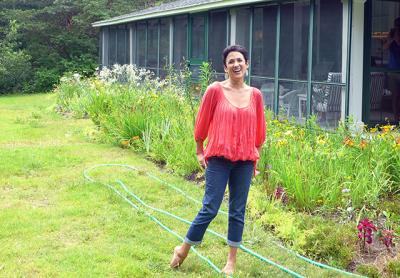Adelaide Mestre: Pieces of a Family Puzzle

“Top Drawer: Stories of Dysfunction and Redemption From Park Avenue to Havana,” a one-woman show written and performed by Adelaide Mestre that combines music and storytelling, will be performed at Guild Hall in East Hampton on Tuesday evening at 7.
First presented at the New York International Fringe Festival in 2011, the musical memoir draws on Ms. Mestre’s life growing up on Manhattan’s Upper East Side amid both privilege and tragedy, and her journey as an adult to Cuba to find the Steinway grand piano her father left behind when the family fled in 1960.
Her father was a concert pianist and a closeted homosexual whose well-to-do Cuban family didn’t support his dreams. Nevertheless, his grandfather gave him the Steinway when he was a little boy. Ms. Mestre’s mother was a socialite whose marriage to her father fell apart when he came out, but whose love for him endured while he struggled with his sexuality and after his suicide.
“My parents might not have been the easiest,” Ms. Mestre said during a recent visit to the house in Barnes Landing she shares with her husband and 2 1/2-year-old daughter. “But there’s so much rich material. All my plays have been autobiographical, but this is the one where I really got to the heart of it. I couldn’t move forward in my life without going back and putting all the pieces together and telling the story.”
Over the course of several years during which “Top Drawer” was performed at a number of New York City venues, Ms. Mestre kept her mother away from it as long as she could. “I was completely terrified to have her see it. I had friends who had gone to workshop readings, and she sent spies out to see how she was portrayed. She got the word that she was probably going to be able to tolerate it. I didn’t know if I could actually survive a performance with her in the audience.”
Ms. Mestre’s mother eventually saw the show a number of times before her death last year. “For me it was sort of like a coming out to my mother about my truth, about how all this stuff landed on me and how I processed it and took it all in. And now I was performing it onstage in front of people.”
While she was critical and judgmental with impossibly high standards, her mother emerges as “kind of the hero” because of her love for her husband. An emotional high point of the play is when Ms. Mestre portrays her mother singing a beautiful song recalling her love for him. “I think ultimately she liked the play. And I think it was actually healing for us, as I grew up in a family where we didn’t talk about things a lot.”
During the play, Ms. Mestre shifts between herself and other characters, among them her mother, a Cuban singing teacher who helped bring her out of her depression after her father died, and the Bulgarian ambassador to Cuba, whose residence had been her father’s home. While relatives who lived in Argentina had visited and photographed the piano, when Ms. Mestre finally got to Cuba the Steinway had disappeared.
In addition to moving between herself and other characters and between music and storytelling, Ms. Mestre also steps out of character and addresses the audience directly. “I have a circuitous way of talking, where I don’t always get to the point, and the show is sort of like that, with digressions by the present-day Adelaide confiding in her audience.”
Ms. Mestre has a long connection to the East End. She spent several childhood summers in East Hampton, where her grandmother had a house, a number of years with friends in share houses, and, most recently, 10 summers in the Barnes Landing cottage. When she first came to East Hampton as an adult, “it felt familiar to me, there was a nostalgia attached to it from when I was little. Doing the show out here feels very special to me.”
Producers in New York City have expressed interest in mounting the show off Broadway and taking it on tour. Tickets, which can be purchased at brownpapertickets.com, are $30, $28 for members.
